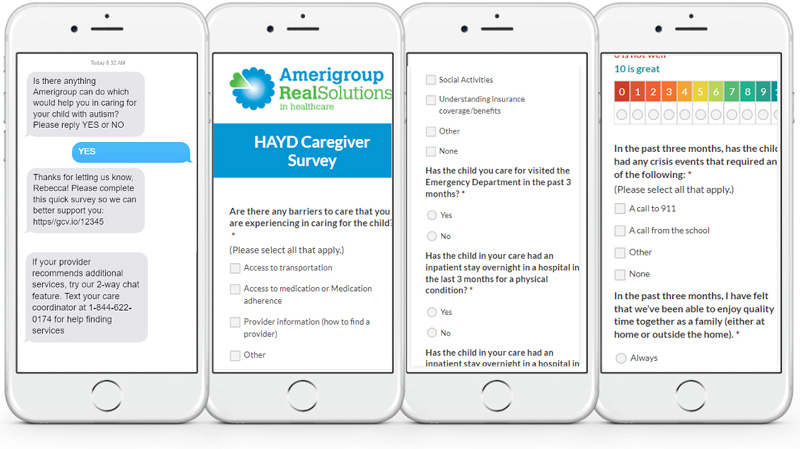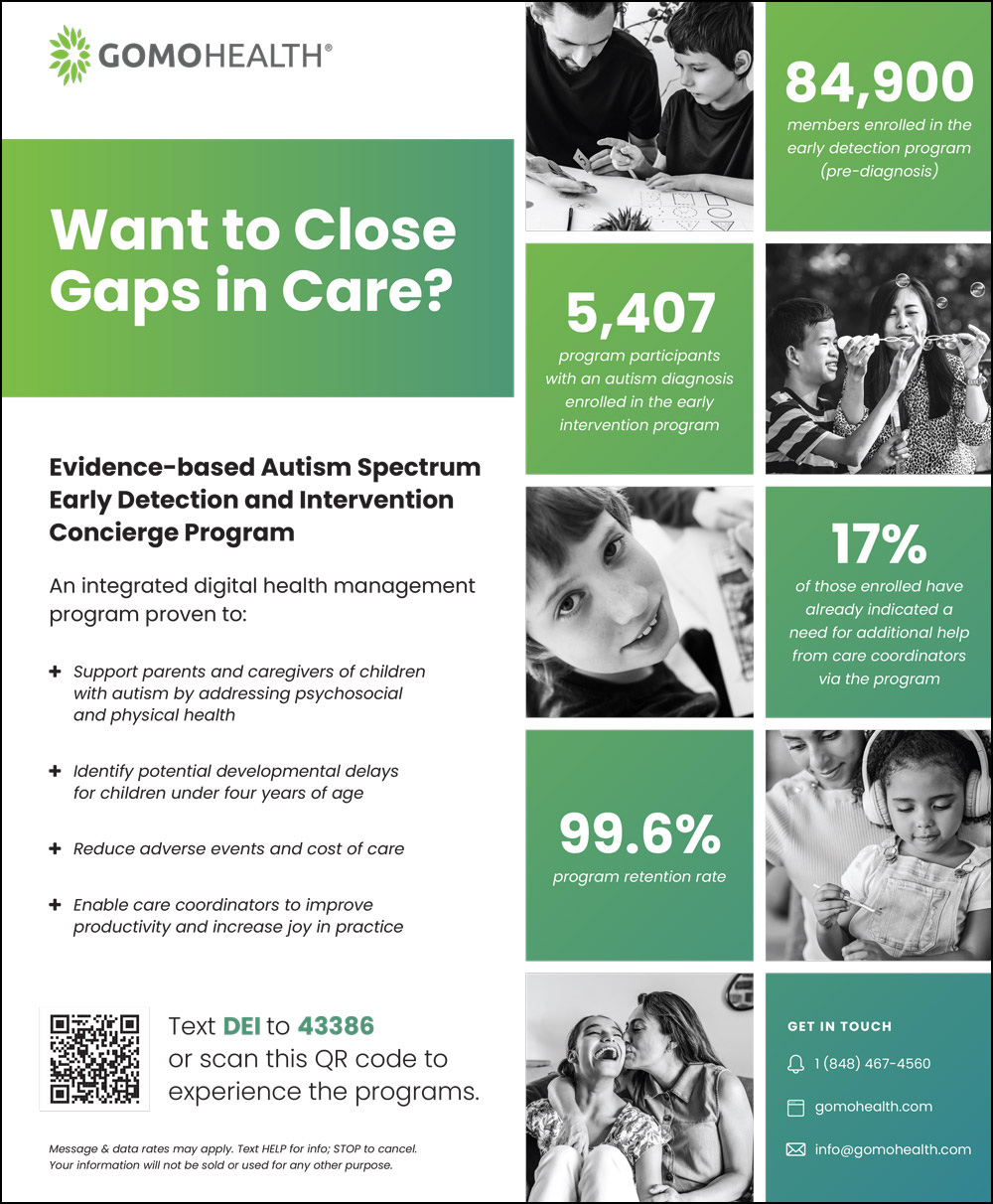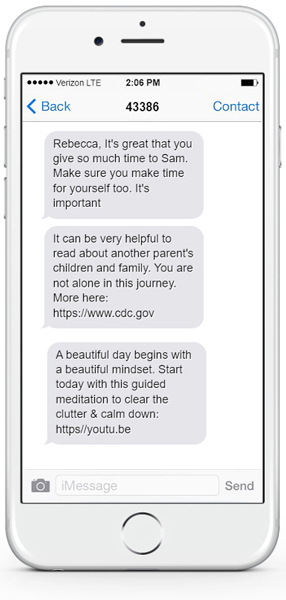The prevalence of autism is at an all-time high. Today, we all seem to know a parent of a child who has been diagnosed with autism spectrum disorder (ASD). According to estimates from the CDC, the rate of autism has more than tripled over the span of two decades: from one in 150 in 2000, to one in 44 children by 2022 (Malik-Soni et al., 2022).

All caregivers are surveyed monthly to assess their support needs. A “Yes” response triggers a link to complete the “How Are You Doing” survey to focus on needs, with appropriate resources being sent in response.
Autism, also known as autism spectrum disorder, is defined by the Centers for Disease Control and Prevention as a “developmental disability that can cause significant social, communication, and behavioral challenges.”
A Statistical Snapshot:
- ASD affects children of any race, socioeconomic status, or ethnic group.
- Boys are four times more likely to be diagnosed than girls.
- Children who have a sibling with autism are more likely to have autism as well, especially twins.
- Autism can be identified as early as infancy, although most children are diagnosed after the age of two. There is no medical test to diagnose autism, so physicians observe a child’s behavior and development to make a diagnosis.
- The American Academy of Pediatrics (AAP) recommends all children be formally screened for autism spectrum disorder at their 18-month and 24-month-old well-child visits; however, they also recommend that pediatricians begin monitoring babies by observing their behaviors beginning with the child’s first well-child visit.
“It is those observations – in combination with family history, health examinations, and parents’ perspectives – that help pediatric primary health care providers identify children at risk for ASD.” – American Academy of Pediatrics
Why the Significant Increase in Autism Diagnoses?
There are several reasons for the sharp increase in autism diagnoses. Over the last decade, better diagnostic tools have been developed and the definition of autism has been expanded to include a ‘spectrum’ of criteria and associated behaviors. As a result of these factors and the rise of accessible information on the internet, there is a much greater awareness of autism among the general population as well as healthcare professionals. Experts in the field also point to changes in insurance legislation requiring health plans to cover autism services as another major factor increasing the prevalence of autism diagnoses (Thompson, 2023).
Effectively Parenting a Child with Autism: Deep Understanding and Patience
Maintaining routines and structure can be grueling for parents. Ensuring regular respite and care breaks is essential. Self-care in the short term will support both child and parent/caregiver well-being in the long-term (Smith et al., 2022).
Early detection, intervention, and support are key for impacting the core symptoms and life course of children with autism and their parents and caregivers. Parents and caregivers are encouraged to discuss concerns and observations with the pediatrician.
Accessing quality health, dental, and behavioral health care for children with autism is a huge challenge in nearly every community. Treatment comes in many different forms, from mental health therapy to occupational, physical, and speech therapies. Sometimes medications can be helpful for other conditions or symptoms related to ASD, like mood problems or the inability to focus.
Finding providers who are knowledgeable about ASD and have made accommodations to support families dealing with autism can be challenging – even more so if seeking providers who accept public and commercial insurance. Oftentimes, when such providers are within network, there are long waiting periods for appointments.
Unique Challenges with Self-Care for Caregivers of Children with Autism
A study published in Clinical Practice and Epidemiology in Mental Health in July 2018 found that parents of children with autism reported a higher level of psychosocial distress and less social support than their counterparts with children with Down syndrome and, the more commonly diagnosed, type 1 diabetes (Picardi et al., 2018). Additional support at the caregiver-level is needed to avoid caregiver burnout and to allow parents and caregivers to continue to fulfill the role to the best of their abilities.
Since 2018, the stressors have only continued to mount for all parents. Living through a global pandemic and all its ramifications has taken a toll on parents. The American Psychological Association (APA) reported in 2021 that 48% of parents experienced an increase in stress levels that year in comparison to their pre-pandemic stress levels.
Beyond the inherent stress and distress of parenting, especially in a post-pandemic world, parents of children with autism are at increased risk to develop depression and anxiety than their counterparts not affected by autism. A 2019 geographically targeted study of 180 mothers of children with autism found that 80.2% met diagnostic criteria for anxiety, as assessed by the General Anxiety Disorder-7 (GAD-7), an industry-standard test for measurement of anxiety, and 72.5% had significant depressive symptoms, as assessed by the Patient Health Questionairre-9 (PHQ-9), a questionnaire that assesses depression severity (Zhou et al., 2019). This is staggering considering the 6.8% baseline prevalence of depression among all parents in the same geography (Li et al, 2021). Additionally, they found a positive association between both the anxiety and depression scores, and the child’s severity of core autism symptoms. The mothers of children with more-severe symptoms were more depressed and anxious than those with children with less-severe symptoms. Therefore, we concluded that improving the core symptoms in the child is then a sound strategy to improve the mental health of their caretakers.
It is this logic that inspired the development of a two-pronged approach to supporting families touched by ASD. We sought to support the parents through a virtuous cycle in which we help them to manage the core symptoms of their child’s autism while also addressing their mental health – which will then improve their ability to care for their child and themselves.
The GoMo Health Person-Centered Digital Health Management Solution
For more information about the Amerigroup Early Intervention Personal Concierge Program and other digital health management programs, please click here or text DEI to 43386.
We partnered with GoMo Health to create the Early Intervention Concierge Program. This mobile engagement program was created to ensure that all Amerigroup members on the autism spectrum receive the appropriate support and resources at the earliest point of intervention. We also made special accommodations to the program to support the unique needs of foster families in our membership to better track children in the foster care system, specifically the care they are under, and be sure these helpful resources are being delivered to those active caregivers. In addition to providing education, resources, navigation, and support to caregivers (including birth parents, foster parents, adoptive parents, and other guardians) to help their child with autism, the program has an entire component focused specifically on the caregiver’s well-being and mental health. The caregiver support track includes tailored messaging, resources, and education based on each individual’s level of need for psychosocial support.
Upon enrollment in the program, participants (in this case, caregivers of Amerigroup’s members with autism between the ages of 0-18) are asked a series of questions to gauge the types of resource/support needs their children have. Additionally, the questions assess the amount of support they need in coping with the stress and challenges associated with their role as a caregiver. Prompt questions include, “In the past three months, how often do you feel you’ve been able to enjoy quality time together as a family?” and, “On a scale of 0-10, how would you rate your overall stress level?” Participants who indicate that they enjoy family time infrequently or never and/or those who indicate stress levels greater than five are automatically contacted by Amerigroup care coordinators (who are notified via ‘smart’ escalation logic) who use GoMo Chat™ (a HIPAA compliant text-based communication system) and/or phone to contact the caregiver directly and work towards de-escalation and avoidance of adverse events.
These same questions are asked again quarterly using the GoMo Health How Are You Doing (HAYD) survey to continuously check-in with members, as overall stress levels and emotional health can change quite frequently. This quarterly check-in also allows assessment of program engagement and its effects on stress levels over time.
In addition to triggering contact from Amerigroup care coordinators, responses to these questions allow participants to enroll into additional program messaging tracks that provide extra support, education, and resources for those with more significant psychosocial needs and stressors. While content is pulsed out in a logic-based, predefined cadence, participants are also able to text in simple keywords that trigger specific in-the-moment content anytime, anywhere. This allows caregivers to receive support within their lived environment and in their specific moment of need.
Since the program’s launch in July 2022, electronic patient reported outcomes data (ePRO) has been collected and indicates strong program impact including:
- 39% reduction in emergency department (ED) visits
- 66% reduction in inpatient stays
- 8% reduction in crisis events
- 25% increase in caregiver-reported child well-being
- 8% increase in caregiver-reported family quality time
- 2% increase in caregiver confidence in caring for their child with autism.
Danielle Nabinger, MSW, is a Consultant with Amerigroup Georgia. Rebecca Lyons, MPH, is Senior Project Manager and Shelley R. Schoenfeld is Chief Strategist at GoMo Health. For more information about the Amerigroup Early Intervention Personal Concierge Program and other digital health management programs, please visit https://gomohealth.com/campaigns/dei-in-healthcare/ or text DEI to 43386.
References
Li, Wen; Yang, Yuan; Liu, Zi-Han; Zhao; Yan-Jie; Zhang, Ling; Cheung, Teris; et. Al. The first national action plan on depression in China: Progress and challenges. The Lancet Regional Health Western Pacific. 2021 Feb.
Malik-Soni, N., Shaker, A., Luck, H. et al. Tackling healthcare access barriers for individuals with autism from diagnosis to adulthood. Pediatr Res 91, 1028–1035 (2022). https://doi.org/10.1038/s41390-021-01465-y
Picardi A, Gigantesco A, Tarolla E, Stoppioni V, Cerbo R, Cremonte M, Alessandri G, Lega I, Nardocci F. Parental Burden and its Correlates in Families of Children with Autism Spectrum Disorder: A Multicentre Study with Two Comparison Groups. Clin Pract Epidemiol Ment Health. 2018 Jul 31;14:143-176
Smith, Melinda, M.A., Segal, Jeanne, Ph.D., Hutman, Ted, Ph.D., Help Guide: Helping Your Child With Autism Thrive. HealthGuide International, Dec. 22, 2022
Thompson, Dennis, Childhood Autism Diagnosis Is Getting Better, But Not for Everyone. HealthDay News, Jan. 26, 2023
Zhou, Wensu MDa; Liu, Dan MPHb; Xiong, Xiyue PhDb,∗; Xu, Huilan PhDa,∗. Emotional problems in mothers of autistic children and their correlation with socioeconomic status and the children’s core symptoms. Medicine 98(32):p e16794, August 2019.










